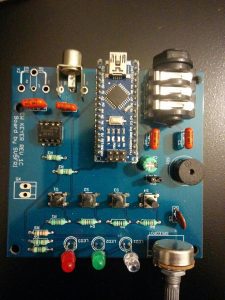My qrp transceiver Bitx40 has been arrived. I will assembly it in the box when have available time.
[print_gllr id=3388210]
My qrp transceiver Bitx40 has been arrived. I will assembly it in the box when have available time.
[print_gllr id=3388210]
 This project has base on the K3NG Arduino keyer open-source firmware adding many features and flexibility.
This project has base on the K3NG Arduino keyer open-source firmware adding many features and flexibility.
The firmware is open source code provided by K3NG so you can customize it to fit your needs.
The Keyer is suitable as a standalone keyer or for keying the radio via the USB port from a connected computer and your favoured contest logging software or for daily operation.
Features:
The Prototype PCB for my the CW Keyer have been arrived (SeeedStudio).
When I have free time I will begin mounting the components on the board.
[print_gllr id=1379278]
Here you find my installations guide how to install dxspider on raspberry Pi. Also you can find more information here wiki.dxcluster.org. If you need help please contact with me.
Furthermore if you don’t want make manual installation you can used my script for the installation and configuration Dxspider.
1. Fisrt change user from pi to root
$ sudo su -l
2. Create user sysop and setup password
# adduser -m sysop # passwd sysop
3. Install perl libraries
# apt-get update # apt-get install libtimedate-perl libnet-telnet-perl libcurses-perl libdigest-sha-perl libdata-dumper-simple-perl
4. Now download and unpack the DX Spider distribution, set symbolic links and group permissions. Copy the tarball to /home/sysop and do the following.
# cd ~sysop # wget http://www.dxcluster.org/download/CVSlatest.tgz # tar xvfz CVSlatest.tgz # ln -s ~sysop/spider /spider # groupadd -g 251 spider
If you do not have the command ‘groupadd’ available to you, simply add a line in /etc/group by hand.
# vi /etc/group
You also need to add some others to the group, including your own callsign (this will be used as an alias) and root. The finished line in /etc/group should look something like this:
spider:x:251:sysop,sv5fri,root
Recent Comments